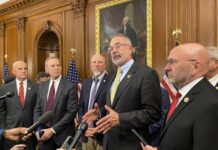
(Georgia Recorder) — A federal judge has denied the state’s end-around attempt to gain back time lost during the Biden administration’s unsuccessful bid to block the governor’s limited Medicaid expansion program.
Judge Lisa Godbey Wood ruled that state officials will have to formally request approval to extend the life of Georgia Pathways to Coverage, which is set to expire in September 2025. The state had instead tried to amend its current agreement with the Centers for Medicare and Medicaid Services.
Requesting an extension is a process that includes a public comment period and a package of information, including evidence showing whether the project’s objectives were met.
“Georgia’s ‘request to extend the end date’ must be treated as a request to extend the end date, that is, an extension request,” Wood wrote.
Pathways is allowed under what is called an 1115 demonstration waiver, which gives states flexibility to experiment within the joint federal-state insurance program for the poor and disabled. It was approved under the Trump administration and immediately faced scrutiny when President Joe Biden took office in 2020.
Wood, a judge with the U.S District Court for the Southern District of Georgia, had sided with the state in 2022 when she ruled that the federal government’s decision to take back approval for key eligibility requirements was unlawful, calling the move “arbitrary and capricious.”
This time, state officials were attempting to push the program’s end date out to 2028. They argued they were seeking the full five years that were originally envisioned for the program.
The program was originally set to start in 2021. Pathways launched in July 2023 after being delayed by the Biden administration, which objected to the program’s requirement that participants complete 80 hours each month of work, school or other qualifying activity.
The judge wrote in her opinion that the state’s argument is “well-taken.”
“CMS’s prior bad act, however, does not allow Georgia to now skirt the rules and regulations governing time extensions,” Wood wrote.
Kemp’s spokesperson, Garrison Douglas, said the state “will continue to pursue the necessary time to demonstrate the program’s viability by working with CMS.”
“We are thankful that Judge Wood’s ruling reaffirms what we have said all along – that the Biden administration’s decision to revoke aspects of the Georgia Pathways program delayed its implementation, appropriately recognizing it as a ‘bad act,’” Douglas said.
“Just as before, we remain committed to this Georgia-specific, innovative initiative that leads not only to health care coverage but to better opportunity and coverage options for those who enroll in the program,” he said.
A spokesperson for CMS said the agency does not comment on litigation.
As of last month, about 4,300 people were enrolled in the program. When the program launched a year ago, state officials were planning for as many as 100,000 people to sign up and said that as many as 345,000 people could be eligible.
Georgia is one of 10 states that have not expanded Medicaid under the Affordable Care Act.
Other Republican state leaders have started to flirt with the idea of rethinking that long-held resistance. There was chatter during the 2024 legislative session about pursuing an alternative to traditional expansion, but a proposal to do so was narrowly defeated after emerging late in the session.
Instead, a nine-member commission is set to continue examining health care coverage for low-income and uninsured Georgians during a series of meetings that will start later this month. That commission is tasked with issuing a report to the governor and state lawmakers this December, just one month before the 2025 legislative session kicks off.







